Helena Sukova and Michael Stich, the 2018 International Tennis Hall of Fame inductees, visit the Tennis Channel desk in Newport:
From the best seat in the house—Sukova & Stich are inducted in Newport
By Steve Flink Jul 24, 2018Social
Katie Boulter cheekily calls out Alex de Minaur's 'elite' red flag behavior for going off the grid
By Baseline Staff Apr 29, 2025Pick of the Day
Madrid Open Betting Preview: Casper Ruud vs. Taylor Fritz
By Zachary Cohen Apr 28, 2025Madrid, Spain
Can Fritz, Shelton and other American men go from “good clay-court players” to great ones?
By Peter Bodo Apr 28, 2025Madrid, Spain
With new coach Dinara Safina, Diana Shnaider makes mental strides in Madrid
By David Kane Apr 28, 2025Madrid, Spain
Aryna Sabalenka vs. Peyton Stearns: Where to Watch, Madrid Preview, Betting Odds
By TENNIS.com Apr 28, 2025Madrid, Spain
Jack Draper vs. Matteo Berrettini: Where to Watch, Madrid Preview, Betting Odds
By TENNIS.com Apr 28, 2025Madrid, Spain
Iga Swiatek vs. Diana Shnaider: Where to Watch, Madrid Preview, Betting Odds
By TENNIS.com Apr 28, 2025Social
"Kids are our future": Jannik Sinner launches eponymous foundation
By Baseline Staff Apr 28, 2025ATP Challenger Tour
Sandro Kopp follows Bayern Munich wherever he goes: “I’m subscribed to all the streaming services.”
By Florian Heer Apr 28, 2025From the best seat in the house—Sukova & Stich are inducted in Newport
steve flink hall of fame helena sukova michael stich
Published Jul 24, 2018
Advertising
NEWPORT, R.I.—I have been present for every International Tennis Hall of Fame induction ceremony since 1995. I have watched a wide range of estimable individuals taking their rightful places at the sport’s majestic historical home. Across this span of time, the honorees have included Evert and Navratilova, Connors and McEnroe, Sampras and Agassi, Graf and Seles, Lendl and Becker, Davenport and Henin, and a cavalcade of other prominent figures. I always look forward to the induction ceremonies. The game evolves so swiftly that it is important to pause each and every year to appreciate those who have altered and reshaped the landscape of tennis in the past.
As I returned to the pristine grounds in Newport last weekend to witness Helena Sukova and Michael Stich accepting their honors as pridefully as it can be done, it occurred to me how fortunate I am to be a member of an exclusive club who will live forever in the Hall of Fame museum and be celebrated permanently at that site. I was inducted at Newport in the Class of 2017 along with Andy Roddick, Kim Clijsters, Monique Kalkman and the late Vic Braden. It was a surreal experience, a weekend that will live irrevocably in my mind, and a time to cherish for a multitude of reasons.
This year, I returned as a confirmed Hall of Famer, and therefore had the luxury of viewing the ceremony from up on the stage, alongside a collection of accomplished individuals including Jim Courier, Jan Kodes, Nancy Richey, Charlie Pasarell, Donald Dell, Owen Davidson, Mark Woodforde and my classmate Clijsters. We walked up onto the stage in the sunshine, sat down in our allotted chairs, and were soon introduced to the crowd by the host Brett Haber. When it was my turn to stand up and be acknowledged by the audience, it dawned on me that, for the rest of my life, I will be afforded the same opportunity every time I go back to Newport.
Advertising
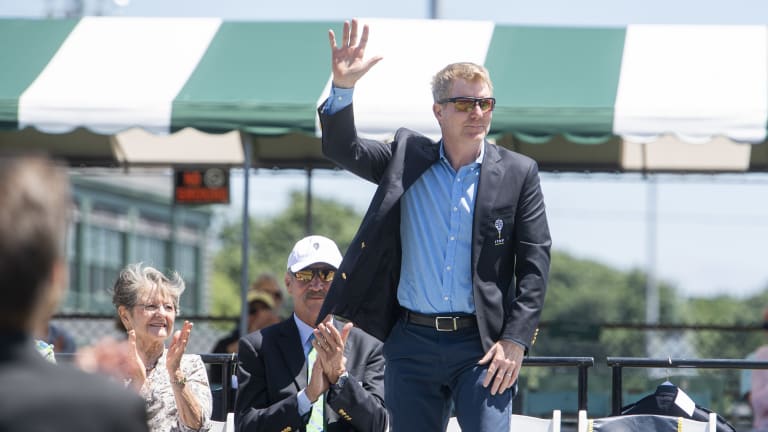
From the best seat in the house—Sukova & Stich are inducted in Newport
© 2018 Getty Images
The focus on only two inductees gave the event a different flavor this year. As I sat there watching the ceremony and feeling far more relaxed than I did a year ago, it was inspiring to see this pair of appreciative honorees so astutely aware of what it all meant and why they should be so humbled by their newfound status.
Sukova was introduced by her brother Cyril Suk, with whom she garnered three of her 14 Grand Slam doubles titles. It took a prolific doubles record like that to send Sukova to Newport in the first place, because in singles her highest achievements were final-round appearances at the 1984 Australian Open and 1986 US Open. Moreover, Sukova also advanced to the final of the 1989 Australian Open and the 1993 US Open to enhance her already impressive record. Suk spoke with simplicity, clarity and reverence about his sister, packing everything he could into a powerful two minute tribute.
He also injected humor to express his admiration for Helena.
“Growing up next to my sister was not an easy task," said Suk. "She was older, smarter, and, unfortunately, taller. I was always looking up to her, not just metaphorically. Any games we ever played, she had to win. By the way, she was a terrible loser.”
That kicker drew widespread laughter from the fans. And then Suk seriously explained what made her a champion.
“She was a great competitor. That’s why she became one of the best tennis players ever to play the game of tennis. Helena was a hard-working professional with dignity and respect to the sport and to her opponents. She always wanted to win. She had a hunger in her eyes. That is the attribute that all great champions have in common.”
Suk could not have done a better job of presenting his sister, setting up her moment beautifully. And the way I saw it, Sukova’s speech was thoughtful, sensitive and well organized. I had seen her at the cocktail party the previous evening, and she had conveyed that she had prepared her speech and put it on paper, wanting to be certain that she would not be overwhelmed by the occasion of addressing her career in front of a vast television audience and a respectable crowd on hand.
Advertising
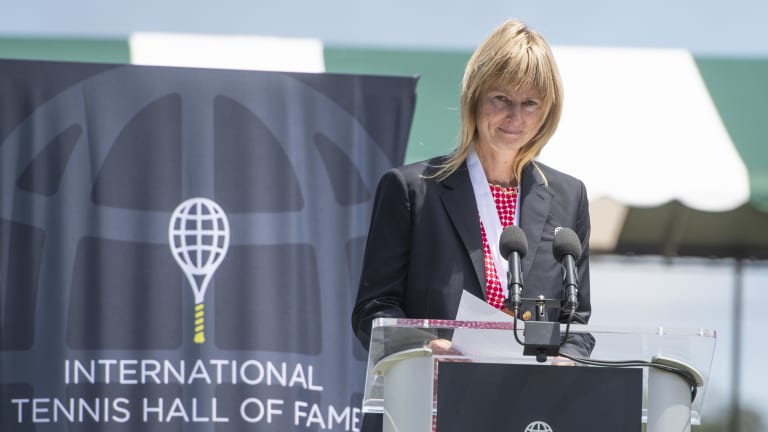
From the best seat in the house—Sukova & Stich are inducted in Newport
© 2018 Getty Images
The commendable thing about Sukova's speech was how much of it was devoted to others, and how little she said about herself. She lauded outstanding Czech players who had preceded her, including Kodes, Martina Navratilova and Hana Mandlikova. She spoke movingly about her late mother, Vera, the Wimbledon finalist of 1962 who passed away at 50 when Helena was in her teens. At the end of her remarks, Sukova crystallized her thoughts on what it meant to be a top-of-the-line player.
“On the one hand, it was a lonely fight,” she said. “But at the same time, there is always a kind of teamwork because you can’t practice alone, you can’t play doubles alone, and alone it is much harder to make any decision to find the best solution.”
When she finished, Sukova did something very gracious and unusual. She greeted all of the Hall of Famers sitting behind her (including me) with either a kiss or a handshake, displaying the depth of her admiration for those who had gone into the Hall of Fame before her. She was entirely well received for that gesture, as well she should have been.
Stories of the Open Era—International Tennis Hall of Fame:
Advertising
And so it was time to turn our attention to Stich, the stylish shotmaker who won the game’s preeminent major in singles and doubles, reached the finals at both the US Open (1994) and Roland Garros (1996), won the ATP Finals (1993), and climbed to No. 2 in the world. He was introduced by Mark Lewis, who coached him so successfully through the years.
Lewis, the brother of 1983 Wimbledon singles finalist Chris Lewis, was eloquent, informative and authentic with his words. He could have done no better in telling the world who Stich is—both the man and the competitor.
Lewis said a good many things that made us understand Stich meaningfully, but I liked most the way he put into perspective the German’s stunning triumph in singles at Wimbledon, in 1991.
“The defining moment of his Hall of Fame career was winning the Wimbledon men’s singles title in 1991 against all odds," Lewis recalled. "Michael was 66-1 starting that fortnight, and after surviving an early round scare, he played some of the most beautiful grass court tennis I’ve ever seen. Michael outplayed our friend Jim [Courier] in the quarters before squeaking by Stefan Edberg [4-6, 7-6 (5), 7-6 (5), 7-6 (2)] in a thrilling semi.
"I vividly remember Michael’s last words to me before he took the court for the final against fellow German Boris Becker. He had this steely look in his eyes and he said, ‘There’s no way I’m going to lose this match’. Of course, he didn’t. Michael is a man true to his word.”
Later, Lewis asserted about Stich, “There are not enough superlatives in my English or German vocabulary to describe Michael Stich as a player or as a person. As I get older and look through my rose-tinted glasses at the time I spent with him, the more I cherish what he achieved and the good times we enjoyed on that journey.”
The author, at far right:
Advertising
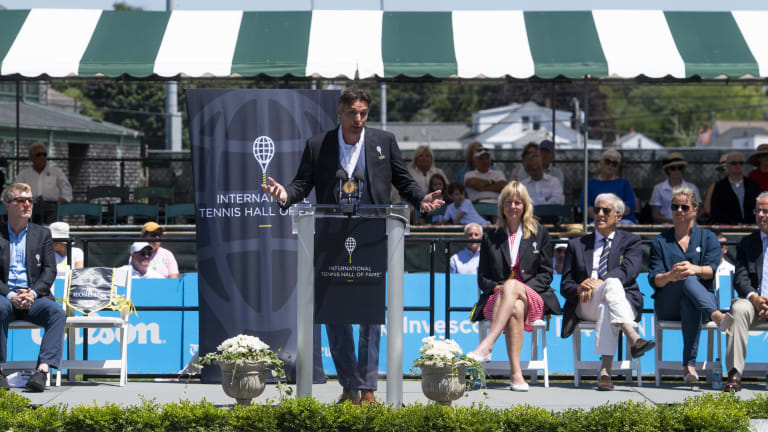
From the best seat in the house—Sukova & Stich are inducted in Newport
© 2018 Getty Images
In contrast to Sukova, Stich elected to speak without any words on paper in front of him. He spoke with utter clarity off the cuff. He had, however, clearly thought through exactly what he wanted to say.
What unfolded was one of the finest speeches I have heard from any inductee. He was choked up at times, and amusing at other junctures. Throughout, he was generous of spirit. It was, quite simply, a magnificent speech.
“I always tried to be respectful to everyone around," he said. "I tried to treat everyone the same and [be] respectful as possible. I was not always the best guy on the tennis court. I was not always the best behaving guy on the tennis court. I could argue with the chair umpire, be unhappy with his decisions. I always walked up to the chair umpire after the match and said, ‘I’m sorry.’ But it has to happen to show emotion sometimes.”
Elaborating on that theme, Stich said, “I think that’s what made our generation so special, and the ones before. We were able to show the emotion. We were able to show the frustration, all the kind of things that is missing a little bit these days. We feel like the players have so much to give. They are such great athletes and champions, but I want to see them angry, happy, get something across. I want to be emotionally involved with all of these players.”
Stich stressed near the end of his speech, “No matter what generation you’re in, no matter what you’ve done or what you’ve achieved, it’s about the people you meet, it’s about how we treat each other and how we respect each other, how we get along with each other. That is the great thing about our sport, about tennis. It’s not about the winning and the losing. It’s about the people that make all of that possible.”
Advertising
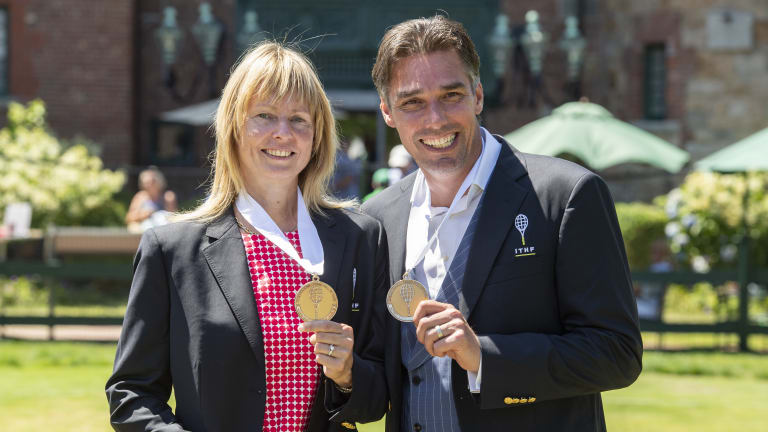
From the best seat in the house—Sukova & Stich are inducted in Newport
© 2018 Getty Images
When the ceremony was over, Stich and Sukova led all of the Hall of Famers on a walk around the court as the fans showered everyone with warm applause. It was a pleasure to be a part of that ritual. I spoke with Clijsters during that walk, and we laughed about how this ceremony was much shorter than the one we participated in a year ago.
Soon the lap was over. I walked back towards the museum with the others and joined the group for photos on the court adjacent to the museum, just inside the Hall of Fame grounds. The setting for those pictures is idyllic. All assembled in that area were people with a deep appreciation for the history of the game. As the photos were taken, Stich was laughing, needling me for being late after I took a brief bathroom break. He was enjoying himself wholeheartedly before flying back to Germany that evening to play an exhibition with John McEnroe. Sukova was beaming. They were letting it all sink in, although it may take some time before they can fully appreciate the magnitude of the honor.
For me it was a moment to savor, a time to reflect, and an occasion to celebrate unabashedly. Surrounded by luminaries, standing proudly on the grass court, looking around me at this collection of luminaries, I was not taking for granted the good fortune that had come my way to be a Hall of Famer and be able to share in the festivities. I never will.
Advertising
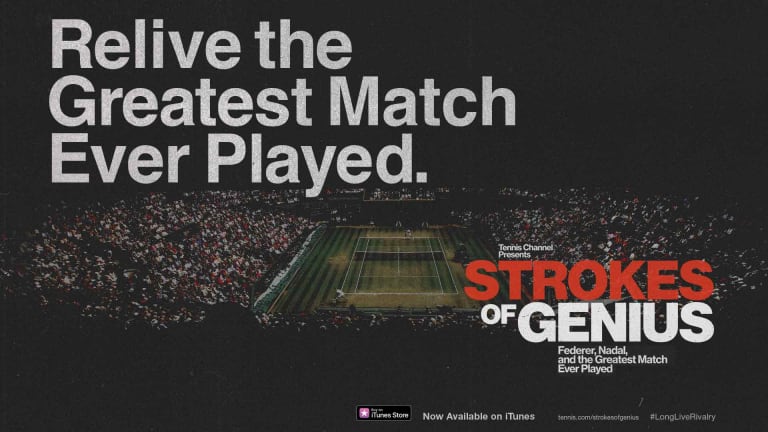
From the best seat in the house—Sukova & Stich are inducted in Newport
Strokes of Genius is a world-class documentary capturing the historic 13-year rivalry between tennis icons Roger Federer and Rafael Nadal. It is timed for release as the anticipation crests with Roger as returning champion, 10 years after their famed 2008 Wimbledon championship – an epic match so close and so reflective of their competitive balance that, in the end, the true winner was the sport itself.